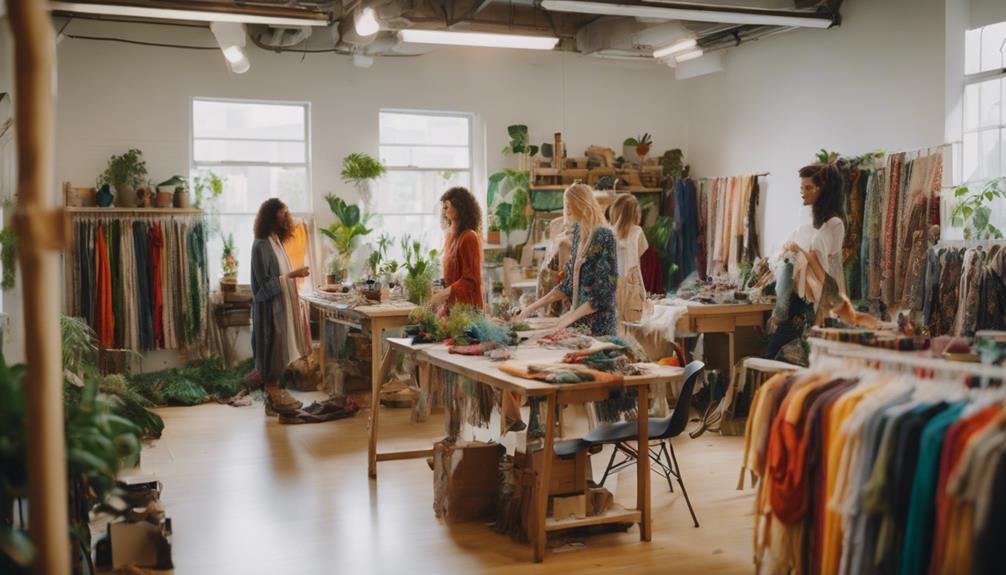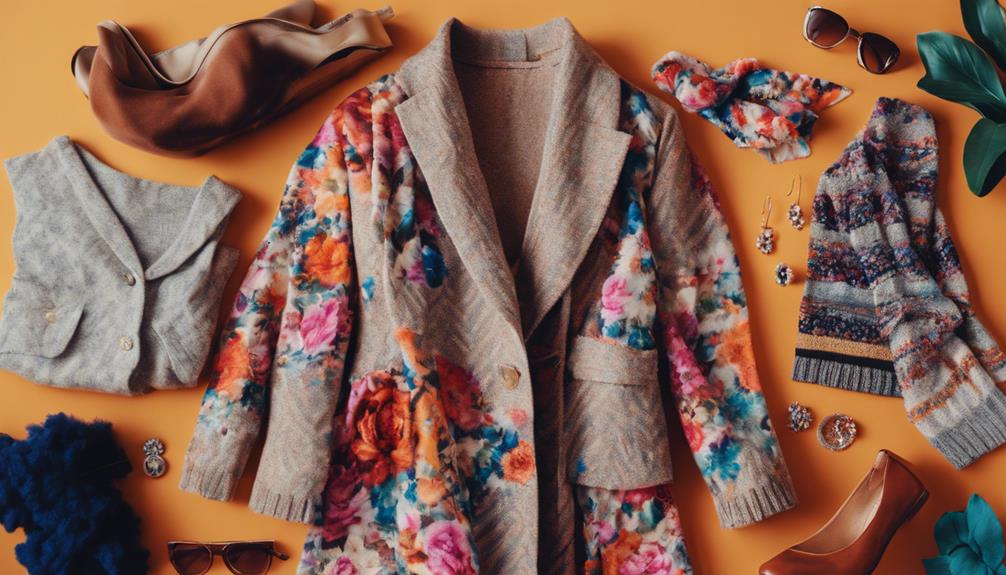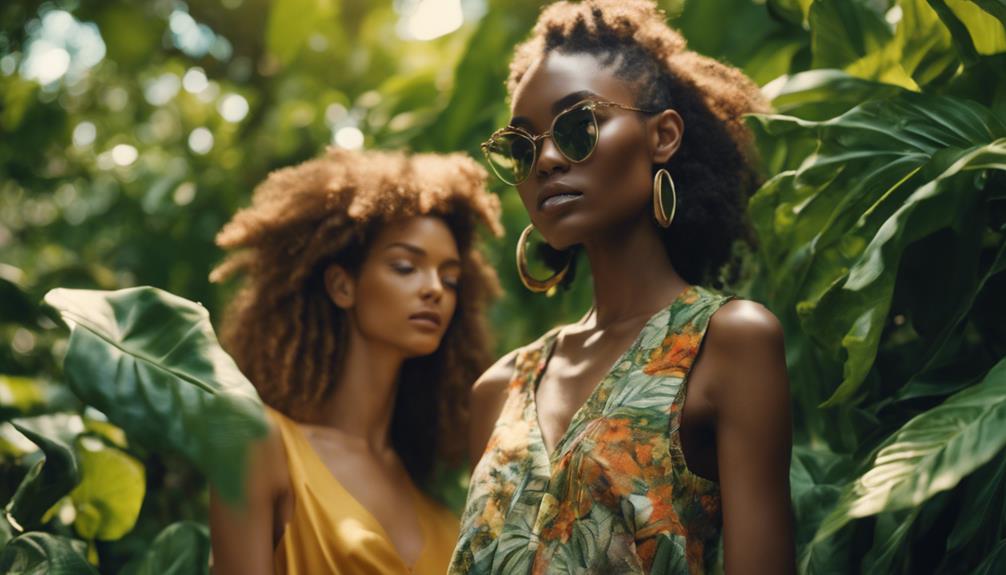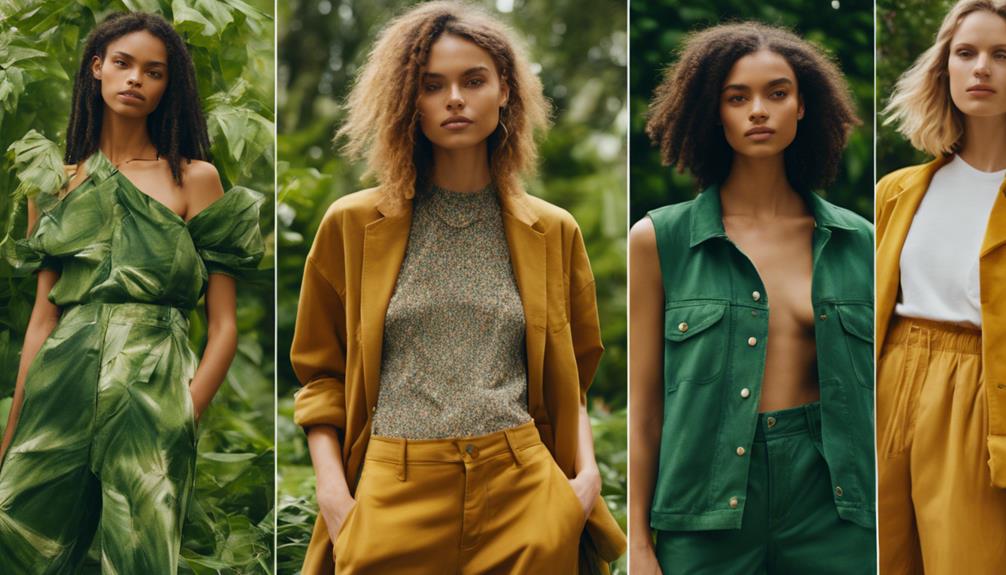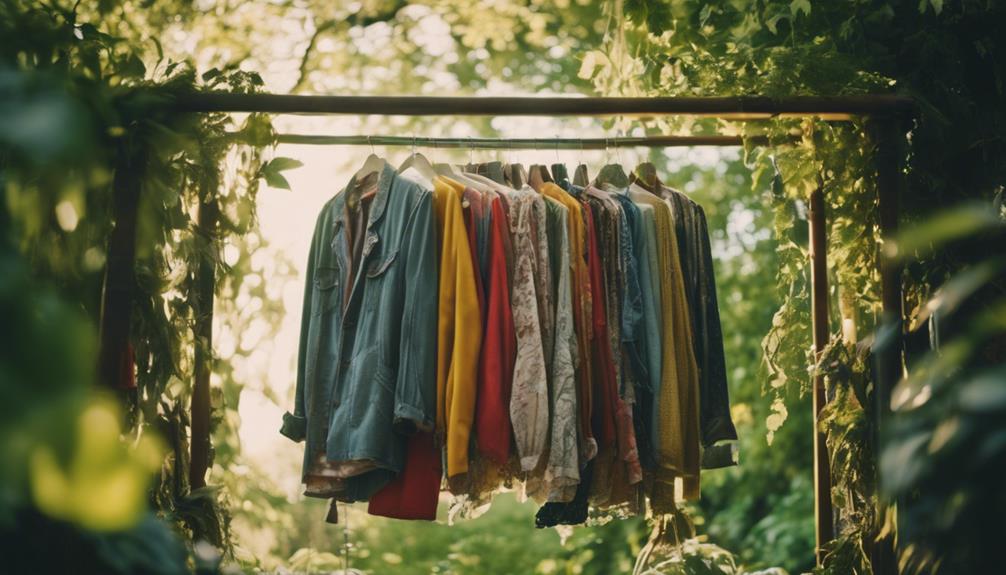When it comes to sustainable fashion, Patagonia stands out as a leader. They are committed to eco-friendly practices, using sustainable materials and Fair Trade factories. In addition, they donate 1% of sales to environmental causes, demonstrating their dedication. Their ‘Worn Wear’ program encourages repair and reuse to reduce landfill waste. Other brands like Reformation and E.L.V. Denim also have innovative approaches to promoting sustainability. If you are impressed by Patagonia, you will be amazed by the efforts of other brands to make a positive impact on the environment and ethical practices in fashion.
Key Takeaways
- Patagonia is often recognized as a leader in sustainable fashion due to its eco-friendly practices and commitment to environmental activism.
- The brand utilizes Fair Trade Certified factories and donates 1% of total sales to environmental causes.
- Their 'Worn Wear' program promotes repair and reuse, significantly reducing textile waste.
- Brands like Reformation and E.L.V. Denim also rank high for their innovative use of sustainable materials and circular economy models.
Overview of Sustainable Fashion
Sustainable fashion focuses on eco-friendly practices that minimize environmental impact and guarantee ethical labor conditions throughout the entire clothing lifecycle. This approach addresses the pressing issues created by the fast fashion industry, which contributes considerably to environmental degradation through overconsumption and massive textile waste.
By choosing sustainable fashion, you're opting for clothing made from sustainable materials like organic cotton and recycled fabrics, which reduce the carbon footprint associated with production.
Moreover, transparency in supply chains is crucial for fostering trust between consumers and brands. As you become more aware of the environmental impacts of your clothing choices, you may find yourself seeking brands that prioritize ethical production and responsible sourcing. This growing consumer awareness drives the shift towards more sustainable practices within the fashion industry.
You can make a difference by supporting companies that not only offer stylish options but also commit to eco-friendly practices and ethical labor conditions. By doing this, you're contributing to a more sustainable future and encouraging the industry to adopt practices that protect our planet and its workers.
Criteria for Evaluation
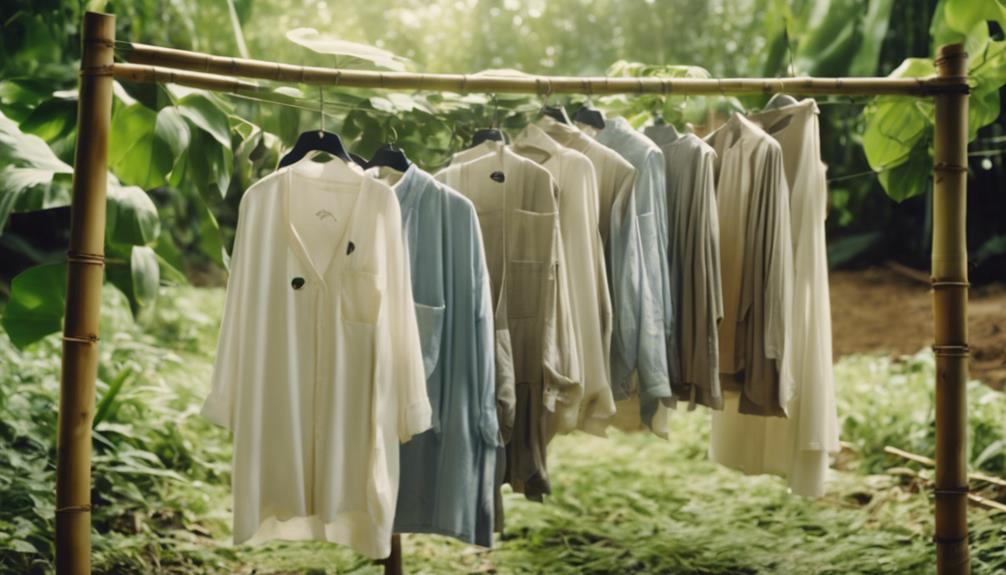
When evaluating a fashion brand's sustainability, you should regularly assess its commitment to eco-friendly practices and transparency in its supply chain.
Look for sustainable fashion brands that prioritize the use of organic or recycled materials in their products, as this illustrates a true dedication to reducing environmental impact.
Certifications like B Corp, GOTS, and Fair Trade are essential indicators of a brand's adherence to strict environmental and social standards. These certifications validate claims and provide assurance that the brand operates responsibly.
Additionally, consider the brand's efforts in waste reduction, such as implementing take-back programs and engaging in circular fashion initiatives.
These practices not only minimize waste but also promote a more sustainable lifecycle for products.
Spotlight on Patagonia

Patagonia stands out as a leader in eco-conscious outdoor apparel, showcasing a strong commitment to environmental activism and ethical practices. You'll appreciate how Patagonia prioritizes sustainability by utilizing Fair Trade Certified factories and sourcing materials from sustainable origins. This guarantees not only ethical labor practices but also transparency within their supply chain.
The brand actively engages in combatting climate change, donating 1% of total sales to environmental causes. You might be surprised to learn that Patagonia's CEO took the remarkable step of donating 98% of the company's stock to further this mission, emphasizing their dedication to sustainability over profit.
Additionally, Patagonia has launched the 'Worn Wear' program, encouraging you to repair and reuse instead of discarding clothing, ultimately reducing waste. This initiative aligns perfectly with their goal of fostering a more sustainable lifestyle.
Other Notable Brands
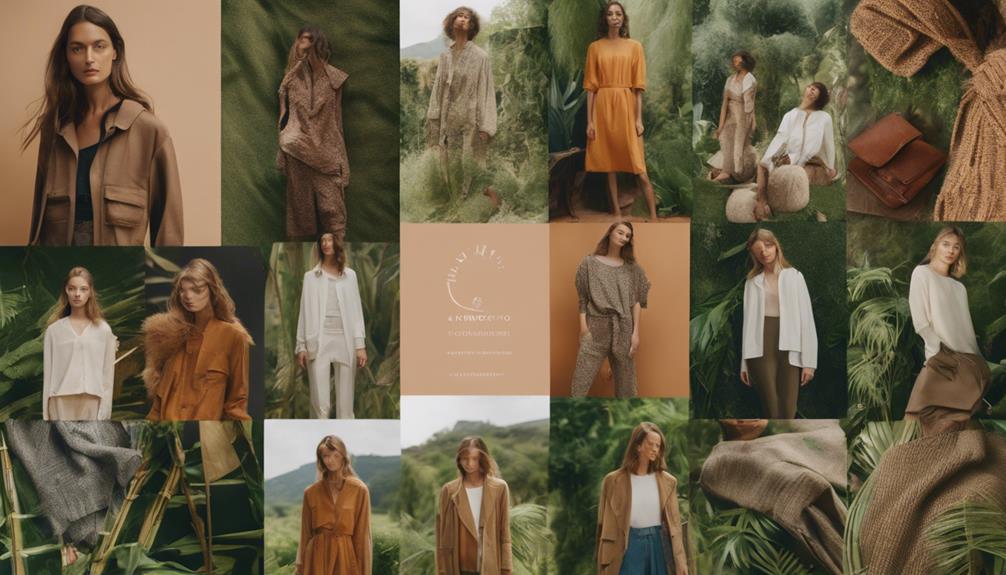
When you explore other notable sustainable fashion brands, you'll find a variety of innovative practices that prioritize the planet and people.
Brands like Reformation and MUD Jeans showcase ethical labor commitments while emphasizing size inclusivity, proving that style can be both responsible and accessible.
These companies set a strong example, encouraging you to think critically about your own fashion choices.
Innovative Sustainable Practices
Innovative sustainable practices are transforming the fashion industry, with brands like E.L.V. Denim and MUD Jeans leading the charge in eco-friendly approaches.
E.L.V. Denim stands out by exclusively using 100% upcycled materials, which not only creates stylish pieces but also considerably reduces landfill waste. This sustainable method directly addresses the environmental footprint of fashion.
MUD Jeans takes a different route by promoting a circular economy through its leasing model. By encouraging customers to return worn jeans for recycling, they effectively minimize textile waste and contribute to sustainability in the denim sector.
Patagonia is another notable brand, renowned for its environmental activism, donating 1% of sales to ecological causes and advocating for repair and reuse via its Worn Wear program.
Reformation is pushing the envelope with ambitious sustainability goals, aiming for climate positivity by 2025. They enhance transparency by providing detailed environmental impact reports for each product.
Finally, Gabriela Hearst showcases innovative practices in luxury fashion by hosting the first carbon-neutral fashion show at NYFW while incorporating about 25% deadstock materials into her collections.
Together, these brands exemplify a commitment to sustainable and ethical supply practices.
Ethical Labor Commitment
Many brands in the sustainable fashion movement prioritize ethical labor commitments, ensuring fair wages and transparent practices throughout their supply chains. This focus not only enhances community impact but also promotes responsible sourcing and eco-friendly materials.
Here are some notable brands making strides in ethical labor practices:
- People Tree: A pioneer in sustainable fashion, they utilize organic cotton and natural dyes while ensuring Fair Trade certified products.
- Nisolo: This brand guarantees fair wages for artisans and maintains transparency in its supply chain, emphasizing sustainability and quality in ethical footwear and accessories.
- Toms: Known for its One-for-One giving model, Toms is dedicated to sustainable materials and ethical manufacturing, positively impacting communities.
- Eileen Fisher: With a strong commitment to circular fashion, this brand uses organic and recycled materials, ensuring fair wages for workers.
Size Inclusivity Focus
Size inclusivity is gaining momentum in the fashion industry, with brands like Warp + Weft and Sèzane leading the charge to guarantee everyone finds a fit that flatters.
Warp + Weft offers an impressive 75 sizes, ensuring you can discover the perfect fit while using less than 10 gallons of water per jean—demonstrating sustainable practices in their production methods.
Sèzane, a B Corp certified brand, emphasizes ethical standards and caters to a size range from XS to XXL, promoting responsible consumption through limited-quantity production.
Reformation offers stylish options for various body types, with sizes from XXS to 3X, while maintaining transparency in their environmental impact data.
Everlane champions size inclusivity, providing clothing from XS to XXL (up to US 20) and focusing on sustainable materials and ethical factories.
Lastly, Thought Clothing highlights timeless designs made from natural and organic materials, ensuring their offerings cater to a diverse range of body shapes.
These brands not only prioritize size inclusivity but also commit to sustainable practices and responsible consumption, making them key players in the evolving fashion landscape.
Impact of Sustainable Fashion
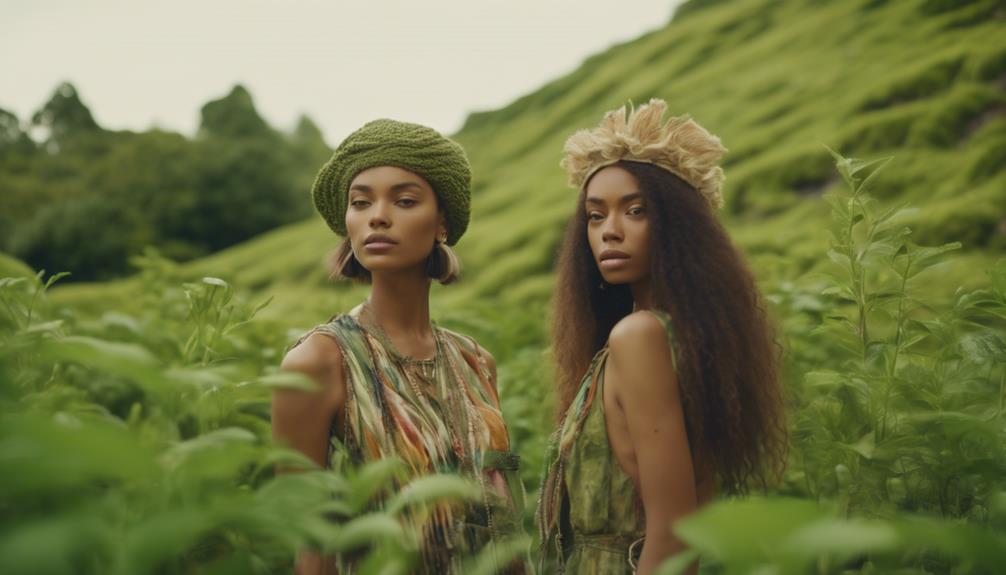
Sustainable fashion's impact goes beyond just style; it reshapes how you think about the environment, labor practices, and the economy.
By choosing eco-friendly materials and ethical labor, you contribute to reducing carbon emissions and promoting fair wages.
Let's explore how these choices make a meaningful difference in our world.
Environmental Benefits Explored
Eco-friendly materials like organic cotton and recycled fibers considerably cut down water usage and carbon emissions compared to traditional fabrics.
By choosing sustainable fashion brands, you actively participate in reducing your carbon footprint and promoting a healthier environment. These brands focus on sustainable production processes that minimize pollution and waste. Supporting sustainable fashion brands also means supporting fair labor practices and ethical treatment of workers. By choosing these brands, you contribute to the improvement of working conditions in the fashion industry and help ensure that workers are paid fairly for their labor. In addition, sustainable fashion brands often use eco-friendly materials and prioritize transparency in their supply chain, allowing consumers to make informed choices about their purchases.
Here are some key environmental benefits of sustainable fashion:
- Reduced water usage: Organic cotton uses considerably less water than conventional cotton.
- Lower carbon emissions: Recycled fibers contribute to a decrease in greenhouse gases.
- Diverting textile waste: Circular fashion principles, like upcycling, help keep materials out of landfills.
- Pollution reduction: Sustainable production processes generate less harmful waste.
Ethical Labor Practices
Ethical labor practices in fashion guarantee that garment workers receive fair wages and safe working conditions, directly impacting their lives and communities. By supporting sustainable brands like People Tree, Nisolo, and Toms, you contribute to a supply chain that prioritizes the well-being of artisans and workers. These brands are committed to transparency, allowing you to trace the origins of your clothing and understand the ethical practices behind their production.
People Tree has been a pioneer in Fair Trade fashion since 1991, ensuring that garment workers are compensated fairly and work in safe environments. Toms operates on a one-for-one giving model, supporting community initiatives while maintaining ethical manufacturing practices. Similarly, Nisolo focuses on fair wages for artisans and promotes transparency in its supply chain.
When you choose sustainable and ethical brands, you're not just making a fashion statement; you're also supporting a movement that values human dignity and social responsibility. This commitment to ethical labor practices creates a ripple effect, uplifting entire communities and fostering a better future for all involved. Your choices in fashion can truly make a difference.
Economic Impact Analysis
As consumer demand for responsibly-made clothing grows, the economic landscape of the fashion industry is changing toward more sustainable practices that not only benefit the environment but also enhance brand profitability. Sustainable brands are capitalizing on this trend by integrating eco-friendly clothing and ethical practices into their business models.
By focusing on sustainable practices, brands can markedly reduce carbon emissions, making a positive impact on the planet.
Here are some key economic benefits:
- Sustainable fashion industry projected to reach $8.25 billion by 2023
- Brands can lower greenhouse gas emissions by up to 50% using organic materials
- Circular fashion models, like recycling programs, can decrease textile waste by 92%
- Shifting to eco-friendly production methods may create around 500,000 new jobs by 2030
These factors show that investing in environmentally responsible practices not only meets consumer demand but also opens up new revenue streams.
As the industry evolves, sustainable brands are poised to thrive, benefiting both the economy and the environment.
Future of Eco-Conscious Fashion

In the coming years, innovative materials and sustainable practices will reshape the fashion landscape, making eco-conscious choices more accessible and appealing to consumers. As you explore sustainable brands, you'll find that many are adopting recycled materials and organic fabrics, greatly reducing environmental impacts. Brands like Reformation are setting ambitious goals, aiming for climate-positive status by 2025 while emphasizing transparency in their operations. This shift is not just a trend but a significant step toward defining the future of sustainable fashion, where ethics and innovation go hand in hand. Collaborative efforts between designers, scientists, and activists are driving advancements such as biodegradable textiles and low-impact dyeing techniques. As awareness grows, consumers are increasingly empowered to support brands that prioritize the planet without compromising on style.
The circular economy model is becoming increasingly important, with initiatives like Mud Jeans' take-back programs, which encourage recycling and minimize waste. As consumer demand for sustainable fashion rises—66% of global consumers are willing to pay more for eco-friendly products—companies are responding with sustainable alternatives that meet your desire for responsible choices.
Moreover, collaborations between fashion brands and environmental organizations are on the rise, promoting ethical labor practices and reducing carbon footprints throughout the supply chain. This shift towards eco-conscious fashion not only benefits the planet but also aligns with your values, empowering you to make informed decisions that contribute to a more sustainable future.
Embrace this change, and you'll find that fashion can be both stylish and responsible.
Frequently Asked Questions
What Is the Most Sustainable Fashion Brand in the World?
When considering the most sustainable fashion brand, you'll find that companies like Patagonia lead the way. They prioritize recycled materials, ethical labor practices, and initiatives that promote repairing and recycling clothing, fostering a circular economy.
Is Zara Sustainable or Fast Fashion?
When you think of sustainability, Zara's fast fashion model might make you cringe. Despite efforts like recycling programs, its rapid production cycles and overconsumption culture overshadow these initiatives, making sustainability feel more like a fleeting illusion.
What Is the Most Ethical High-End Brand?
When considering the most ethical high-end brand, you'll find Stella McCartney leads with its commitment to sustainability. Gabriela Hearst and Ninety Percent also stand out, prioritizing eco-friendly practices and social responsibility in luxury fashion.
Which Luxury Brand Is Not Sustainable?
When it comes to luxury brands, it's like looking for a needle in a haystack. Many, such as Louis Vuitton, aren't sustainable due to unsustainable practices, carbon-heavy production, and a lack of transparency in their processes.
Conclusion
So, you thought finding the most sustainable fashion brand would be a challenging task, didn't you?
Well, surprise! It's not just about who's the best at recycling; it's about the whole ethos behind the brand.
Whether it's Patagonia or another under-the-radar gem, you now know that eco-conscious choices can be stylish too.
Who knew saving the planet could look this good?
Embrace your newfound knowledge and strut your sustainable stuff—you might just start a trend!
